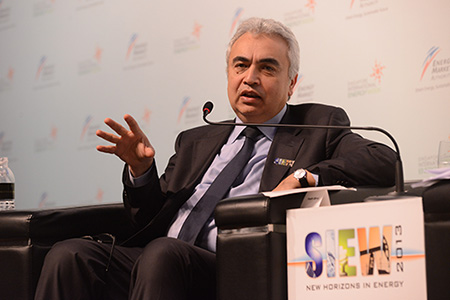
Dr Fatih Birol views on Asia’s future energy outlook
“The centre of gravity of global energy demand is moving to the east, slowly but surely,” Dr. Fatih Birol, Chief Economist of the International Energy Agency (IEA) told a panel audience at the Singapore Energy Summit (SES) today.
Dr. Birol said that two-thirds of future global energy demand growth will come from China, India and the Southeast Asia region.
In Southeast Asia, he said, key drivers of energy demand were the growth in car ownership and electrification of rural populations. And he pointed out that 140 million out of 600 million people in this region still do not have access to electricity.
Dr. Birol was speaking at the SES panel “Powering Asia’s Future Energy Needs” together with Datuk Seri Dr. Maximus Ongkili, Minister of Energy, Green Technology and Water of Malaysia; Mr. Le Luong Minh, Secretary-General of ASEAN; Mr. Yang Qing, Executive Vice President of State Grid Corporation of China; andn Mr. Dan Yates, CEO & Founder of Opower. Ambassador Barry Desker, Dean of S.Rajarantnam School of International Studies was moderating.
Mr. Yates told the audience that “20% of energy today is wasted”. He then talked about how behavioural approaches work universally in changing consumer energy consumption. Based on his experience in United States, his company managed to save around two per cent of energy demand just by giving individual consumers’ information on how they fared against the average consumer’s consumption.
Datuk Seri Ongkili and Mr. Yang Qing discussed their countries’ policy responses to energy issues. At the regional level, Mr. Le Luoung Minh talked about how the Tran-ASEAN gas pipelines and ASEAN power grid can help in securing ASEAN’s energy future.
Moderator Ambassador Desker asked the panelists for their views on Asia’s future energy outlook, and Dr. Birol reiterated that price signal is important in determining the fuel mix in Asia. He gave the example of United States where carbon emissions dropped to 1990s level as they switched from coal to gas for electricity generation. The only reason for the switch was that gas prices were lower than coal prices – and not anything to do with environmental considerations.
Dr. Birol warned against distortions such as fuel subsidies, estimating that such subsidies in the Southeast Asia region amount to USD15 billion and suggesting that this is creating an artificial boost to fossil-based fuel demand. Dr. Birol commented: “It is wrong to believe that subsidies do protect the poor.”
Lastly, he pointed out that if the government’s policies remain as they are he would foresee that the future energy outlook for Asia will still be fossil-fuel dominated.
BY : Li Zhenhui